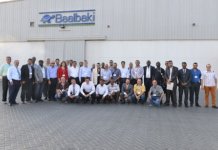The Arab world has a long history of giving to and caring for their fellow human beings. A cultural and religious sense of responsibility for the well-being of others can be felt throughout all layers of society: Caring and sharing is a natural element of common behaviour in this part of the world. In several regions, where governments cannot or will not act to support the population, private contributions are even more crucial to the survival of some.
Farida El Agamy, Swiss Attorney at Law, discusses the various aspects of philanthropic behaviour and CSR activities of Arab family businesses. Family businesses, as the pillars of Arab economies, have always been very active in their communities and have long been well-known for their social support programs and funds. Their thinking tends to be more long-term oriented and is strongly linked with surrounding communities through history and family ties. Through religious and traditional discretion about philanthropic activities, however, there is a great lack of knowledge and research into the real impact of family and family business charity and corporate social behaviour.
Interestingly, family businesses are not “restricted” to private charity; family businesses combine two dimensions, the family and the business, through which it may impact its community even further, implementing socially responsible and sustainable business models (corporate social responsibility CSR).
In order to get a better picture and to assess how family-owned firms might extend and increase the impact of their commitment, it is necessary to understand all the forms of altruistic behaviour that can be found and where business strategies can become an instrument to improve the well-being of the community.
Charity or Philanthropy?
Hard as it is to define the concept of “doing good”, it is even more difficult to reach a conensus as to what altruism, charity and philanthropy really signify. The terms are being used differently depending on the cultural, regional and political context. For example in the UK the word “philanthropy” seems to provoke a certain feeling of stiffness and old-fashioned ways, whereas in the US the same feeling is implied by “charity”. Yet, despite all the disagreement it is clear that the one true and permanent characteristic of altruistic, charitable, philanthropic behaviour and certainly religious altruism, is that one gives without expecting anything in return: The motivation for charitable activity is purely the conviction that it is the “right thing to do”. There is no restriction as to who exercises charitable activities – the actors can be individuals, families or corporations.
The ways to “give”
Charity can take a variety of forms, spanning from a highly professionalized organization with a clear strategy and focus to the simple act of giving alms to a beggar. Family businesses for example may have have a family foundation (e.g. Sharbatly Foundation, see box) or run a special charity program (e.g. Almajdouie Shumua Al Amal, see box). The charity may be given from the company’s proceedings or privately by the family. Some family members even dedicate a large part of their time to participating in community interest projects and through their network in the communities families are often involved in supporting individuals in situations of distress.
To date there is no comprehensive research into the impact of family and family business charity in the Arab world, yet it is easily believed that their contribution is crucial and extensive. Recent research in Europe has shown that family foundations are one of the main providers of charitable funds in many European countries. Most of these family foundations are related to a family business and for example account for almost one third of overall charitable activity in Germany.
A new dawn for philanthropy
As the worlds interconnectivity and interdependence grows each day and yet a large part of the world population still lives at the edge of existence, the vital importance for more sustainable and long term support as well as solution-driven charity is clear. As we can observe a worldwide move to render philanthropic engagement more efficient, it is of the essence that the Arab world and especially Arab family businesses reflect on the way they are active within their communities and how they interact with their stakeholders. Families could find ways to even increase the already vital impact they have on the well-being of so many members of our society. New strategic models of philanthropic work are currently being developed to replace traditional forms of charity. Through initiatives like the World Congress of Muslim Philanthropists (www.thewcmp.net) or the Arab foundations forum (www.arabfound.org) first steps towards a more holistic approach for altruism in the Muslim world can be observed. Family-owned businesses should take advantage of this general trend and take part in such initiatives. As historically important philanthropic actors, family businesses may greatly contribute to assessing the modern needs in philanthropy and at the same time learn from best practices.
CSR in Arab Family Businesses
Due to their unique combination of family and business, next to charitable activities, family firms can implement a second system of social commitment that is fundamentally different from the general philanthropic and charitable activities. Bluntly put corporate social responsibility (CSR) is a set of procedures implemented in and by a company that leads to sustainable business behaviour and positively influences the way it interacts with its stakeholders. For instance, CSR may influence the way the company structures the workplace by issuing codes of behaviour. Furthermore, it can mean adhering to employment standards, analyzing the environmental impact and rendering the company more energy efficient by managing resources, which are classical fields of corporate responsibility. Of course, corporate philanthropy can also be part of CSR, which shows that CSR comprises a wide range of means for the responsible conduct of business. Interestingly enough, CSR can be used to create a competitive advantage for the company by boosting its image and rendering procedures within the company more cost-effective. In order to achieve this win-win situation between stakeholder and business, CSR systems should become part of the company’s overall strategy and an element to consider when conducting due diligence and risk assessment.
Arab family firms and sustainable business
As much as Arab family businesses are active in charity, CSR seems to be a field that has not yet really triggered their interest. But CSR could present interesting models for family-owned and –run firms to interact even more with their community whilst supporting their business development. There might be certain obstacles that have to be overcome before family businesses can successfully implement corporate sustainability systems. In order to have an efficient CSR system, strong corporate governance is indispensable. The members of the owner family and of the management must be equally aware of the impacts of their business and be ready to implement change.
Recent reports by the Dubai Chamber of Commerce have shown that family businesses have a more rigid approach when it comes to innovating existing corporate structures in order to strive towards corporate responsibility. The Chamber found that while 92% of public companies have corporate governance measures in place, only 50% of family or government-owned businesses have similar strategies.
CSR could prove a very powerful tool for internal and external motivation. With the consumer’s and international business partner’s increasing sensitivity when it comes to sustainable business processes, it seems indispensable to open a dialogue on the use of sustainable business structures. A recent German study has revealed that that efficient corporate responsibility has drastically increased overall employee motivation, enhanced the good image of a company, reduced fix costs and through more consumer awareness led to increase in returns. Results of good CSR processes become even clearer after some time, as the example of the multinational mining company Anglo American shows: a couple of years ago the company held that their 10 million US$ investment in HIV testing and treatment started to pay off as it reduced employee absenteeism and meant longer lives of skilled workers.
Communicating the family’s charitable and CSR activities
Whether or not to speak about one’s charitable activities is a tough decision. Phillip Morris for instance is known to have spent 75 Mio. US$ on charitable contributions and then launched a 100 Mio. US$ advertising campaign to publicise them. It is clear that this hits a rather ironic note.
Therefore making a clear difference between philanthropic and CSR activities is essential for families when deciding about communication. On the one hand Arab families should hold on to their traditions and cherish the religious and cultural principle that social engagement should not be spoken of. Yet, effective analysis of philanthropic activities and professional expertise should be a goal in the near future in order to sustain the impact families are already making. On the other hand, companies should not shy from adopting a clear communication strategy about their CSR activities and use it as an effective marketing tool.
Arab family businesses as leaders in the field
Arab family businesses have always been and will continue to be extremely important to their communities by generously contributing to the overall well-being through charitable activity. As recent years have shown a more strategic approach to philanthropy is of the essence and families may be able to benefit from available expertise whilst still maintaining their preferred low profile. Through their long-term visions, family businesses furthermore have the potential to excel in the field of sustainable business: Since family firms are naturally interested in ensuring good governance tools in order to increase the longevity of their enterprise, they should see the potential of some of the CSR tools to even further support and secure their vision.
Examples of Philanthropic and CSR Activities in Arab Family Businesses
1. Shumua Al Amal
It is the Almajdouie family that stands behind the impressive charitable project “Shumua Al Amal – Special Education & Rehabilitation” in Saudi Arabia. The center is located in Dammam, KSA and hires professional staff to work with children with special needs. Their aim is to develop procedures and specialized services in the field of rehabilitation and special education for children and to make the center’s expertise available as widely as possible. The center provides education and parent counseling and supports research and development projects in their field of activity.
2. Hassan Abbas Sharbatly Foundation
The Hassan Abbas Sharbatly Foundation was established by the late Sheikh Hassan. Today the Sharbatly family honours his life-long social engagement by making the foundation a priority for the family business, the Al Nahla Group, located in Jeddah, KSA. The foundation’s programs are very varied and widely spread throughout the Arab world. Examples from among their 20 main programs are their Mosque-building and maintenance projects, the development of digital libraries, knowledge promotion and health care programs.
http://www.alnahlagroup.com/social.asp
3. SS Lootah
S.S. Lootah founder Haj Saeed Bin Ahmed Al Lootah strongly believed he had a moral responsibility to help his community, both through business as well as his personal actions. Based on this, he set the guiding principle of the Group as “Business exists fundamentally to serve people” and started developing a remarkable portfolio of non-profit educational institutions. For instance, the Dubai Medical College is the first private college to award a degree in medicine & surgery in the UAE. The college was established in 1986 as a non-profit educational venture by Haj Saeed Lootah to offer girls in the UAE and the region an opportunity to study medicine without having to travel abroad. Furthermore, S.S. Lootah has been pursuing a vision to integrate clean and renewable energy technologies across the areas of alternative energy, clean transportation and green buildings.
4. Sawiris
The Sawiris Foundation for Social Development was founded in April 2001, with an endowment from the Sawiris family. It constitutes one of the first family foundations dedicated to social development in Egypt. The Foundation provides grants to fund projects implemented by partners.
http://www.sawirisfoundation.org/
Altruistic and corporate responsible behaviour:
A Glossary
Altruism is the practice of unselfish concern for or devotion to the welfare of others.
Charity: According to the dictionary, charity means as much as benevolent goodwill toward people or love of humanity or generosity and helpfulness especially toward the needy or sufferingThe Word is mostly employed in the UK, where it has been further defined in the “The Charity Commission/Charities Act 2006”. This law describes that charitable purposes can be grouped under four main headings: the relief of financial hardship; the advancement of education; the advancement of religion and certain other purposes to the benefit of the community.
Corporate responsibility is generally understood as a concept that contains all elements of corporate social responsibility, corporate governance, business ethics and corporate reporting standards. Corporate Social Responsibility (CSR) is a concept that is also known as corporate citizenship, responsible business, sustainable responsible business (SRB) and corporate social performance. There is no general agreement as to the exact definition of CSR. The World Bank defines it as: “the commitment of business to contribute to sustainable economic development – working with employees, their families, the local community and society at large to improve the quality of life in ways that are both good for business and good for development”. CSR should be part of the business model and part of the overall company strategy. CSR activities may include elements of philanthropy, ethics, compliance with regulatory frameworks and laws, and environmental sustainability.
Philanthropy: The word derives from Ancient Greek, meaning “to love people”. It generally means any altruistic activity that is intended to promote good or improve human life. It can thus be the act of donating money, goods, services, time and/or effort to support a socially beneficial cause with a defined objective and with no financial or material reward to the donor.Philanthropy is generally perceived as a more strategic and long-term altruistic involvement than Charity. The word is mostly employed in the US.
Sadaqah is an Islamic term that means “voluntary charity”. This concept encompasses any act of giving out of compassion, love or generosity. It has been emphasized that Sadaq should always be given secretly.
Socially responsible investment (SRI): An investment that is considered socially responsible because of the nature of the business the company conducts. For example socially responsible investments may include avoiding investment in companies that produce or sell addictive substances (like alcohol, gambling and tobacco) and seeking out companies engaged in environmental sustainability and alternative energy/clean technology efforts.
Waqf is a permanent endowment or Islamic charitable foundation formed through voluntary donation by the owner of a property dedicating the usufruct to some charitable ends for the duration of the property’s existence.
Zakat: By Islam prescribed charity, collected or received for public welfare. The Zakat is one of the five pillars of Islam and is sometimes called “regular charity” or described as “obligatory charitable wealth tax”.
Background papers can be obtained with the author. Please contact info@tharawat.org
Tharawat Magazine, Issue 3, 2009
















